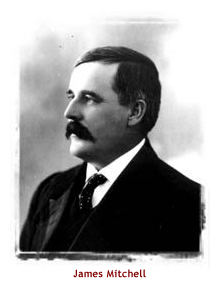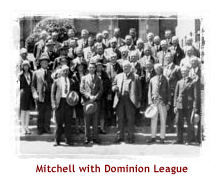James Mitchell (1866-1951)
James Mitchell was born at Dardanup, near Bunbury. As a young man he worked for the Western Australian Bank, becoming a manager in Northam in 1890 just as the long-established farming district was about to benefit from the demand for produce fuelled by the discovery of gold. Mitchell remained in Northam where he too engaged in farming from 1892. In October 1905 he won the seat of Northam in the Legislative Assembly and by 1909 was Minister for Lands and Agriculture. During the next two years he enthusiastically continued government policy encouraging new agricultural settlement. Between 1906 and 1911 the acreage under wheat trebled due to the institution of an Agricultural Bank to provide cheap loans to farmers, the development of William Farrer's Federation wheat which enabled farming in drier districts, and the introduction of superphosphate. Poor years in 1911, 1912 and 1914 saw Mitchell blamed for the difficulties experienced by farmers in the new wheat belt. After periods serving as a Minister and in Opposition Mitchell became Premier in 1919. He won the 1921 election and remained in office until 1924. During this first period he instituted the Group Settlement Scheme, which would dominate his career. After much hardship and suffering the scheme resulted in the eventual development of a dairy industry in the south-west.  Mitchell
concluded an agreement with the British Government to settle 15,000 migrants
on the land. The migrants and their Australian foremen, however, were often
poorly chosen, lacking the resources to clear hardwood timber or the necessary
farming skills to succeed. By 1924 when Mitchell left office 42 per cent
of the British settlers had walked off the groups. Mitchell
concluded an agreement with the British Government to settle 15,000 migrants
on the land. The migrants and their Australian foremen, however, were often
poorly chosen, lacking the resources to clear hardwood timber or the necessary
farming skills to succeed. By 1924 when Mitchell left office 42 per cent
of the British settlers had walked off the groups.After eight years in opposition, Mitchell won the 1930 election with the promise of 'Work for All', yet within two years the Depression had seen unemployment rise to 30%. Like most governments at the time, Mitchell's was unprepared and unable to cope with the world-wide slump. On 8 April 1933, on the same day that Western Australians voted to secede, Mitchell, like every Nationalist member of his cabinet, lost his seat in the State election, despite his support of the Dominion League. |
Please note: The content on this website is made available for archival purposes and may not meet the State Library of Western Australia's current standards for web accessibility, mobile device compatibility, historical accuracy and cultural sensitivity.